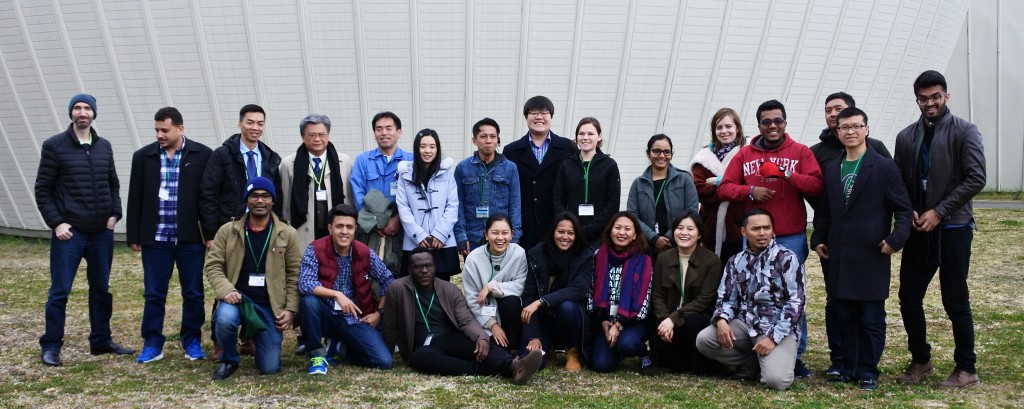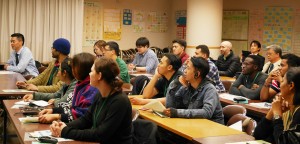Sustainable Urban Development for the World’s Megacities
The United Nations University Institute for the Advanced Study of Sustainability (UNU-IAS), and the ProSPER.Net Secretariat held the 2018 ProSPER.Net Young Researchers’ School (YRS) in Kanagawa, Japan, from 4-11 March, 2018.
Twenty students from 18 universities from around the Asia-Pacific region from 15 countries spent one week in Kanagawa, Japan, learning about the theme ‘Sustainable Urban Development for the World’s Megacities’.
By 2030, it is estimated that almost 60% of the world’s population will live in urban areas. Whilst cities occupy just 3% of the Earth’s land, they consume the majority of the resources. As the world becomes more urbanised, cities – in particular megacities – have a key role to play in achieving the SDGs.
The main goal of the 2018 ProSPER.Net YRS is to provide graduate students with an opportunity to engage with issues related to sustainable development in the context of planning and policy making in megacities, while also developing research and communication skills. By assembling these young scientists together for an intensive week-long workshop, the School fosters the growth of a network of sustainability scholars and professionals in the Asia-Pacific region, whilst also encouraging future professionals to work within the field of sustainable development.
Read a summary of the School here.
——————————————
Programme
Monday 5 March, 2018
| Time | Activity | Presenter/s | Outcome/s |
| 9:15-10:15 | Opening Session / Welcome remarks | MC – Prof. Mario Tabucanon (UNU-IAS) Dr. Kazuhiko Takemoto (UNU-IAS) Dr. Philip Vaughter (UNU-IAS) | |
| 10:30-11:00 | Keynote presentation on SDGs and Cities | Dr. Kazuhiko Takemoto (UNU-IAS) | Presentation slides |
| 11:00-12:00 | Lecture 1: 2030 Agenda and the SDGs – Research Implications | Prof. Mario Tabucanon (UNU-IAS) | Presentation slides Lecture summary |
| 13:20-14:50 | Lecture 2: Research Proposal Development | Dr. Philip Vaughter (UNU-IAS) | Presentation slides Lecture summary |
| 15:20-16:50 | Lecture 3: Urban Transportation Systems “The Limit to Urban Growth in Transport – from Congestion, Low Carbon to SDGs” | Prof. Yoshitsugu Hayashi, (Chubu University) | Lecture summary |
Tuesday 6 March, 2018
| Time | Activity | Presenter/s | Outcome/s |
| 9:00-10:30 | Lecture 4: Waste Management – Water and Solid Waste | Assoc. Prof. Kengo Kubota (Tohoku University) | Lecture summary |
| 10:45-12:00 | Lecture 5: Research Communication | Mr. Daniel Powell (UNU Office of Communications) | Presentation slides Lecture summary |
| 13:00-13:30 | 3 minute thesis introduction | Mr. Daniel Powell (UNU Office of Communications) | |
| 13:30-15:00 | Lecture 6: Urban Water Security | Dr. Yoshifumi Masago (UNU-IAS) | Presentation slides Lecture summary |
| 15:15-16:45 | Lecture 7: Urban Climate Change Mitigation and Adaptation | Dr. Riyanti Djalante (UNU-IAS) | Presentation slides Lecture summary |
| 16:45-18:15 | Life after PhD | Moderator: Prof. Mario Tabucanon Dr. Junichi Fujino (IGES) Dr. Riyanti Djalante (UNU-IAS) Dr. Philip Vaughter (UNU-IAS) | Presentation slides |
Wednesday 7 March, 2018
| Time | Activity | Presenter/s | Outcome/s |
| 9:00 | “Future City Yokohama: Projects for Decarbonized Society” | City of Yokohama | Presentation slides |
| “Overview of the District Heating and Cooling Facility” | Minato Mirai 21 Netsu Kyoku Co. | ||
| 10:45 | Visit to MM 21 District Heating and Cooling system Second Plant | Minato Mirai 21 Netsu Kyoku Co. | |
| 13:30-17:00 | Visit to Northern Waste Water Treatment facility Visit to Tsurumi Recycling Factory |
Thursday 8 March, 2018
| Time | Activity | Presenter/s | Outcome/s |
| 9:00-10:30 | Lecture 8 City & Environment: Municipalities’ management of urban development: exploring non-binding impact fee system for housing development in 1970s Japan | Dr. Kenji Asakawa (IGES Researcher) | Lecture summary |
| 13:15-14:45 | Lecture 9: Urban Disaster Risk Reduction | Dr. Riyanti Djalante (UNU-IAS) | Presentation slides Lecture summary |
| 15:00-16:30 | Lecture 10: Urban Metabolism: Conceptualizing the City as an Organism | Dr. Alexandros Gasparatos (University of Tokyo) | Presentation slides Lecture summary |
——————————————
Research Proposals
Group 1: Governance for Sustainable Development in Megacities
Effectiveness of Implementing Green Building Tools in Five ASEAN Countries
Vishanthini Kanasan (Universiti Sains Malaysia); Nguyen Ngoc Cuong Tran (Western Sydney University); Yuqing Yang (Tohoku University); Wai Yar Lin Zin (Mahidol University); Sunwoo Kang (Keio University)
Group 2: Urban Ecosystems in Megacities
Sustainable Greening Strategies for Megacities in Developing Countries
Arlene Gonzales (Asian Institute of Technology); Yangyang Li (Nanyang Technological University); Swati Singh (TERI University); Hafiz Syed Hamid Arshad (Asian Institute of Technology); Md. Shiblur Rahaman (Hokkaido University)
Group 3: Housing and Infrastructure in Megacities
Promoting Sustainable Housing Production and Consumption in Japan: What Lessons Can We Learn from the ‘Katitas Model’?
Sameera Edirisinghe Mudiyanselage (University of Peradeniya); Godwin Festival Boateng (RMIT University); Wendy Wuyts (Nagoya University); Hongru Hong (University of Tokyo); Shahid Ali (Prince of Songkla University)
Group 4: Urban Planning in Megacities
Investigating Low-carbon Transport Options in Dhaka, Bangladesh
Syampadzi Nurroh (Universitas Gadjah Mada); Hendra Sandhi Firmansyah (Institut Teknologi Bandung); Nowar Abdulmajeed (Griffith University); Yu Shi (Tongji University); Sonya Kozak (Griffith University)
——————————————
Student Voices
Students had their say about their experience at the YRS:
“…an enjoyable experience that challenged me.” – Sonya Kazak (Griffith University)
“For me [the] 3MT presentation and group proposal development was the most valuable component. It will definitely help me in the future.” – Swati Singh (TERI School of Advanced Studies)
“[The most valuable component was] the chance to discuss with many other participants from different backgrounds, countries and cultures and experts from varied disciplines.” – Sunwoo Kang (Keio University)
“The 3 minute presentation practice was very challenging but helpful in training us to see and present our own research in clear, concise and communicable way, as we all need to convey own findings to the public eventually.” – Hongru Hong (University of Tokyo)
“The lectures were certainly important, but the field trips, especially to the water treatment and waste management facilities were humbling. I came to appreciate even more how the people diligently toil everyday to get us water, prevent disasters etc. We do not normally reflect/think critically about these things. But I found what they do HEROIC!” – Godwin Festival Boateng (RMIT University)
We also asked students for their thoughts on the following questions:
What do you think are the biggest challenges in the city you’re from in relation to sustainability?
“I’m from Lahore city, in Pakistan, that is the second largest city in Pakistan. I found that the expansion of the city is absorbing all of the green areas around and within the cities, so this one, for me, is a very big challenge because until now, the city government cannot handle this issue. The second thing is, the public transport, that’s not in line with the sustainability goals, because the city government is not planning public transport projects, it’s all individual transportation going on, which is not sustainable according to me.” – Hafiz Syed Hamid Arshad (Asian Institute of Technology)
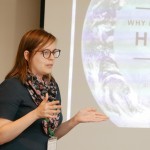 “I come from two very highly developed countries, Belgium, and now I do my PhD in Japan, and I see a lot of similarities in both countries… I think one of the big problems for both countries is very ageing infrastructure, like housing… I see trends to renew this to make it more energy-efficient to adapt and comply with the regulations. On the other hand, if we have to renew all of this infrastructure in Japan and Belgium, we would need a lot of energy, a lot of capital, a lot of materials, and I wonder from an economical and also from an ecological perspective, is there enough resources to do this, also in the meantime, also developing countries need materials to build up their infrastructure and their houses. So I think that’s one of the big issues – are we going to be able to have enough resources?” – Wendy Wuyts (Nagoya University)
“I come from two very highly developed countries, Belgium, and now I do my PhD in Japan, and I see a lot of similarities in both countries… I think one of the big problems for both countries is very ageing infrastructure, like housing… I see trends to renew this to make it more energy-efficient to adapt and comply with the regulations. On the other hand, if we have to renew all of this infrastructure in Japan and Belgium, we would need a lot of energy, a lot of capital, a lot of materials, and I wonder from an economical and also from an ecological perspective, is there enough resources to do this, also in the meantime, also developing countries need materials to build up their infrastructure and their houses. So I think that’s one of the big issues – are we going to be able to have enough resources?” – Wendy Wuyts (Nagoya University)
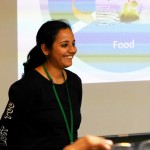 “I come from India, which is a developing economy, [one which] is changing from a traditional rule-based economy to a more industrial-based economy… because of unplanned urbanisation, overgrowth and expansion of the cities beyond the carrying capacity, and the shortage of natural resources, this is actually adding to more social problems, economic problems, and environmental degradation of the area around it. Definitely this is not going to be sustainable in the long-term if we don’t address the issues at this moment, so when we are talking about sustainability and the Sustainable Development Goals, cities provide a promising opportunity to address these issues in a more holistic way by adopting policies, plans and practices from the local level so that we can address the issues at the global level.” – Swati Singh (TERI School of Advanced Studies)
“I come from India, which is a developing economy, [one which] is changing from a traditional rule-based economy to a more industrial-based economy… because of unplanned urbanisation, overgrowth and expansion of the cities beyond the carrying capacity, and the shortage of natural resources, this is actually adding to more social problems, economic problems, and environmental degradation of the area around it. Definitely this is not going to be sustainable in the long-term if we don’t address the issues at this moment, so when we are talking about sustainability and the Sustainable Development Goals, cities provide a promising opportunity to address these issues in a more holistic way by adopting policies, plans and practices from the local level so that we can address the issues at the global level.” – Swati Singh (TERI School of Advanced Studies)
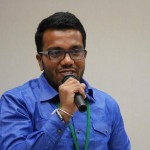 “What I think is most important in other countries from the perspective of sustainability is human inter-relationships and the holistic approach of the fields. In our country [Sri Lanka], I can’t see any kind of human inter-relationships, so the engineers most of the time don’t incorporate the social public, they don’t ask what they want.” – Sameera Darshana Jayasooriya Edirisinghe Mudiyanselage (University of Peradeniya)
“What I think is most important in other countries from the perspective of sustainability is human inter-relationships and the holistic approach of the fields. In our country [Sri Lanka], I can’t see any kind of human inter-relationships, so the engineers most of the time don’t incorporate the social public, they don’t ask what they want.” – Sameera Darshana Jayasooriya Edirisinghe Mudiyanselage (University of Peradeniya)
What sustainability features would you like to see in megacities incorporated in the next 30 years?
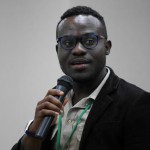 “For me, the core of sustainability issues is consumption and production, those are the key issues, so being more climate aware in terms of the things that we produce and also consume will go a long way to influence what we see in cities.” – Godwin Festival Boateng (RMIT University)
“For me, the core of sustainability issues is consumption and production, those are the key issues, so being more climate aware in terms of the things that we produce and also consume will go a long way to influence what we see in cities.” – Godwin Festival Boateng (RMIT University)
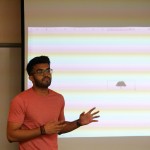 “For me it would be the greenery in megacities, in the form of urban agriculture. I want megacities to have greenery with some food production, because it has benefits in all of the three aspects: social, economic, and environmental.” – Hafiz Syed Hamid Arshad (Asian Institute of Technology)
“For me it would be the greenery in megacities, in the form of urban agriculture. I want megacities to have greenery with some food production, because it has benefits in all of the three aspects: social, economic, and environmental.” – Hafiz Syed Hamid Arshad (Asian Institute of Technology)
 “I would like to see in the perspective of structural engineering, that construction and built environment should be efficiently built, that means in most of the countries they utilise steel construction, we need to think about how to optimise the utilisation of steel… we need to reduce the CO2 emissions from that utilisation.” – Sameera Darshana Jayasooriya Edirisinghe Mudiyanselage (University of Peradeniya)
“I would like to see in the perspective of structural engineering, that construction and built environment should be efficiently built, that means in most of the countries they utilise steel construction, we need to think about how to optimise the utilisation of steel… we need to reduce the CO2 emissions from that utilisation.” – Sameera Darshana Jayasooriya Edirisinghe Mudiyanselage (University of Peradeniya)
——————————————
Photos
Photos from the 2018 ProSPER.Net YRS can be found on ProSPER.Net’s Facebook page here.

